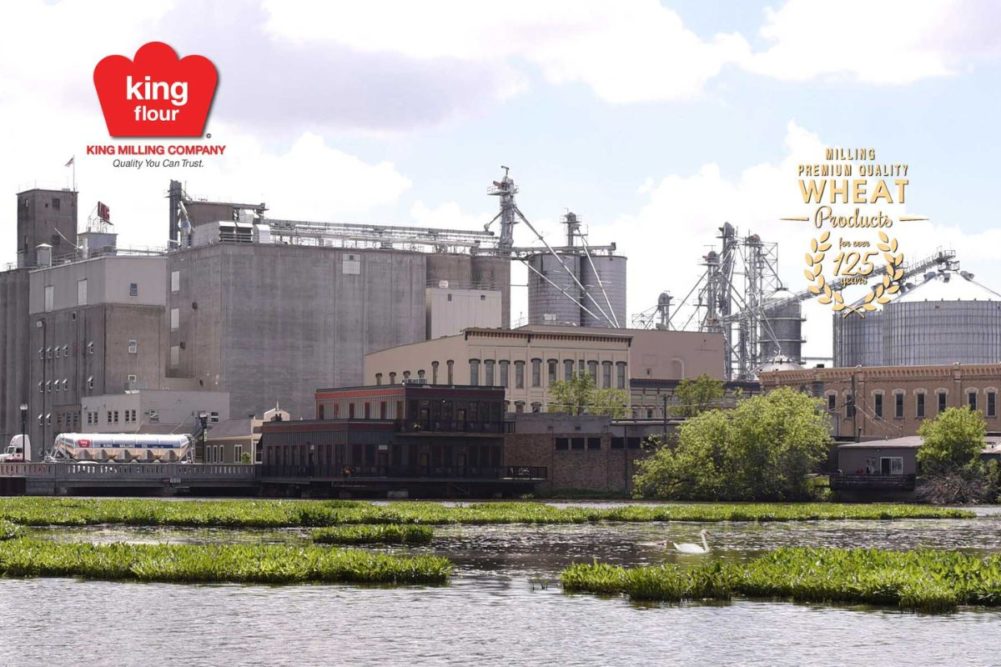LOWELL, MICHIGAN, US — King Milling Co. on June 21 announced plans to build a new flour mill in Lowell, Michigan, US, at a cost of $42 million.
The new milling unit will have daily flour production capacity of 7,500 cwts, which would increase total capacity of the Lowell mill to 24,500 cwts. The fourth milling unit on the site, the mill will be dedicated almost entirely to the production of hard wheat flour. Currently, the company’s A mill is a swing mill, producing hard wheat and soft wheat flour; the B mill (added in 2014) produces hard wheat patent flour; and a C mill produces whole wheat flour.
King Milling said the decision to expand was “fueled by strong demand” for the company’s flour.
“King Milling is proud of our century-plus presence in the Lowell community and the tremendous growth we have experienced since our humble beginnings in 1890,” said Brian Doyle, president of King Milling. “This is the largest single investment we have made, and it will provide benefits to Michigan’s agriculture and food processing sectors for many years to come.
“This expansion is part of our commitment to being on the leading edge of milling technology and producing the highest-quality flour and wheat products for our customers here in Michigan and around the country.”
Doyle told Milling & Baking News, a sister publication of World Grain, that while the new mill will produce hard wheat flour, the decision to build the facility was prompted by strong demand for both hard wheat and soft wheat flour. He said the addition will “take pressure off the A mill” as the company seeks to keep pace with demand.
Bühler, Inc., Plymouth, Minnesota, US, has been engaged as the principal equipment supplier for the new mill. Automation systems will be supplied by Kice Industries, Inc., Wichita, Kansas, US. Todd & Sargent, Inc., Ames, Iowa, US, will serve as contractor.
As part of the project, 150,000 bushels of grain storage capacity will be added at Lowell. The mill already has 3.6 million bushels of grain storage.
The mill, a six-floor, 35,000-square-foot facility, is expected to be operational by the end of 2023. The company said it is working to complete permitting so it will be able to break ground on the project this summer. The building will be large enough to accommodate a second milling unit if the company decides to expand in the future.
King said the project was made feasible by a 12-year, 50% tax abatement for the project approved at a city council meeting June 20. In May, the Michigan Commission of Agriculture and Rural Development (MDARD) approved a $250,000 Food and Agriculture Investment Program grant.
King Milling said that with the addition, the company would be adding six new jobs within the first two years.
MDARD’s Food and Agriculture Investment Program grants are awarded to businesses looking to “increase production space, expand services through a sustainable and scalability focus, create new good-paying jobs and help increase Michigan’s food and agriculture global footprint,” King Milling said.
“Investing in local businesses like King Milling helps create good-paying jobs, supports local economies and fuels the continued growth of Michigan’s vital food and agriculture sector,” said Gary McDowell, director of MDARD. “This project — made possible in part by MDARD’s Food and Agriculture Investment Program — underscores King Milling’s commitment to Michigan. They will be able to process more wheat locally, meet demand from bakers and cereal producers across the nation and create new opportunities for our wheat growers.”
Already the largest flour mill in the state, King Milling will account for about half of Michigan’s flour milling capacity once the new mill is operational, based on data in the 2022 Grain & Milling Annual, published by Sosland Publishing Co.




